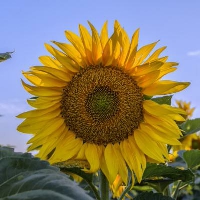1. Introduction to Lu You:
Lu You (from November 13, 1125 to January 26, 1210), known as "Wu Guan", was born in Shanyin, Yuezhou (today's Shaoxing, Zhejiang), the grandson of Lu Dian, Shangshu Youcheng, a litterateur, historian and patriotic poet of the Southern Song Dynasty.
When Lu You was born at the time of the fall of the Northern Song Dynasty, he was deeply influenced by family patriotism when he was young. During the reign of Emperor Gaozong in the Song Dynasty, when he took part in the Rites Examination, his official career was blocked because he was rejected by Qin Hui, a slayer. After he ascended the throne, Emperor Xiaozong of the Song Dynasty, who was awarded the title of Jinshi, served successively as the chief clerk of Ningde County in Fuzhou, the official appointed by the imperial edict, and the general judge of Longxing Mansion. Because of his insistence on fighting against gold, he was repeatedly rejected by the moderators. In the seventh year of Qiandao (1171), at the invitation of Wang Yan, Sichuan Xuanfu envoy, he joined the army and served in the Nanzheng shogunate. The next year, the shogunate was dissolved, and Lu You was sent to Sichuan under an imperial edict, and became acquainted with Fan Chengda, the official of Sichuan. After succeeding to the throne, Song Guangzong was promoted to be a doctor in the Ministry of Rites and a review officer in the Real Record Institute. Soon after, he was dismissed from office and returned to his hometown because of "mocking and chanting Fengyue". In the second year of Jiatai (1202), Lu You, the imperial edict of Song Ning Zong, entered Beijing and presided over the compilation of Xiaozong's and Guangzong's Two Dynasties Record and Three Dynasties History. After the completion of the book, Lu You lived in seclusion for a long time in the mountains. In the second year of Jiading (1210), he died for a long time and wrote his last novel, "The Demon.".
Lu You never stopped writing all his life and made great achievements in poetry and stationery. The language of his poetry is easy and clear, the organization is neat and strict, and it has both Li Bai's magnificence and Du Fu's sadness, especially the patriotic enthusiasm which has a profound impact on later generations. His achievements in poetry and prose are also high. Liu Kezhuang, a native of the Song Dynasty, said that his poetry was "inspiring and generous, and Jiaxuan could not pass". There are 85 volumes of Jiannan Poetry Manuscript and more than 9000 poems. There are also 50 volumes of Weinan Anthology, 10 volumes of Notes of Laoxue Nunnery and Southern Tang Script. The calligraphy is vigorous and unrestrained, and the surviving ink includes "Bitter Cold Calligraphy", etc.
2. Lu You's works:
Lu You has created a lot in his life. According to the Complete Works of Lu Fangweng carved by Jigu Pavilion, there are 50 volumes of Weinan Anthology (including 6 volumes of Entering Shu and 2 volumes of Ci); 85 volumes of Jiannan Poetry Manuscript (including 9138 ancient and modern poems); Fangweng's Manuscript, 3 volumes; Southern Tang Book, 18 volumes; Notes of Laoxue Temple, 10 volumes; 8 pieces of "Old News of Family History"; There are 36 articles in Zhaiju Chronicle. In addition, there are 2 volumes of "Continuation Notes", 1 volume of "Gaozong Shengzheng Grass", 2 volumes of "Lu's Continuation", 1 volume of "Perception Record", 1 volume of "Qingzun Record", 1 volume of "Xuxun", and 1 volume of "Fangweng Family Instructions". [137] Representative works of genre works collection
Prose Notes of Laoxue Nunnery, Collected Works of Weinan, Southern Tang Book, Quiet Town Hall, Tonghu Pavilion, Shu Wei Bridge, Smoke Boat, Book Nest, On Learning Two Wangs, Family History, Zhai Ju Chronicle, Fangweng Family Motto, Emperor Gaozong's Sacred Administration Grass, Perception Record, Qing Zunlu, Xu Xun, Lu's Continuation, Examination of Entering Shu, Sacrifice to Leichi
Poetry "Jiannan Poetry Draft", "Fangwengyi Draft", "Guanshanyue", "Wind and Rain on November 4", "Traveling to the West Village", "The Beginning of Spring Rain in Lin'an", "Huangzhou", "Reading in Winter Night to Show My Childhood", "Calligraphy Anger", "Showing My Love", "Pillow Works", "Plum Blossom quatrains", "The Beginning of Spring Rain in Lin'an", "Jincuo Knife Line", "Learning from Sickness", "Reading in Winter Night to Show My Childhood", "Shen Garden Two Poems" Feeling of Coming out of the Fen Gate to Welcome the Cool in Autumn Night, Sleeping in the Shen's Garden Pavilion on the Second Day of December, Thinking in Autumn, Sleeping in the Water Village at Night, Thinking in the Nunnery at Midnight, Encountering Light Rain in the Sword Gate Path, Feeling of Watching the Great Pass, and Giving the Cave to Weishan People
Ci Poems "Fangwenci", "Weinan Ci", "Night Tour Palace: Memorizing Dreams and Sending Shibo Hun", "Hairpin Phoenix: Red and Crisp Hands", "Bu Tuan · Singing Plum", "Xie Chi Chun · Zhuang Sui Cong Rong", "Partridge Sky · Home in the Smoke Room", "South Village · Returning to Dream and Sending Wu Bo", "Linjiang Immortal · Li Guozhou Works", "Partridge Sky · Lazy to Learn to Plant Melons in Qingmen", "Que Qiao Immortal · One Pole Wind Moon" Spring in the Palace of Han Dynasty: Painting in Chengdu from Nanzheng at the Beginning of the Spring Festival; Butterflies in Love with Flowers; Tongye Whispering at Night in the Morning; Confessing Sincerity; Seeking Marquis in Those Years; Night Tour Palace: Memorizing Dreams and Sending Shibo Hun

